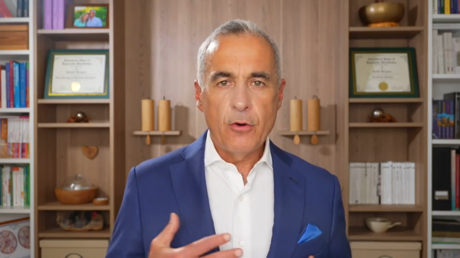ARTICLE AD BOX
Taliban officials in Afghanistan have reportedly warned female journalists and women to avoid mass media platforms and not appear on media unless they are dressed in code, which includes Only their eyes were visible.
The Afghanistan Journalists Center, or AFJC, a press freedom organization in the country, said the warning came Tuesday from the head of the Taliban's ministry of promoting good and preventing evil. Mohammad Khaliq Hanafi issued during a meeting with journalists in Kabul.
In a statement on its website, the AFJC quoted ministry spokesman Abdul Ghaffar Farooq as recommending the meeting to adhere to the Baha'i dress code, which depicts images of women in black dresses and niqabs, which Most of their faces are covered, leaving only their eyes visible.
The organization said that Farooq also suggested that television news channels avoid interviewing women who do not observe hijab or do not cover their faces completely.
The statement said Hanafi warned that if these directives were not implemented, Taliban leader Haibatullah Akhundzada could ban women from working in the media.
Ministry officials are yet to comment on the reported meeting or its details.
The media watchdog group has said it is deeply concerned about the state of Afghan media and the potential impact of the ban on women working in the media, who already face widespread restrictions on their work.
The statement said Hanafi's warning could ultimately lead to the elimination of women from the media in Afghanistan, where the Taliban already imposes widespread restrictions on most women's access to education and work or public life.
The AFJC said in its statement that local media professionals face tough working conditions that require strict implementation of media guidelines that the Taliban will retake in 2021. was introduced.
The Afghan Journalists Center has stated that some of the current directives prevent women from working in national radio and television stations, require gender-based segregation in workplaces, and suppress women's voices in some provinces. And prohibits the broadcasting of phone calls.
The AFJC moved its office out of Afghanistan after the Taliban took over, but says its staff are still in Afghanistan and involved with local media outlets there.
The Taliban have banned television dramas featuring female actors and made it mandatory for women reading the news on television to wear the Islamic hijab.
The Taliban have barred teenage girls from getting an education beyond the sixth grade. Women aid workers are prohibited from working for non-governmental organizations related to humanitarian aid, including the United Nations, except in the health sector, and women are also not allowed in public parks, gyms, etc.
In a report released on Thursday, the United Nations special envoy for the humanitarian situation in Afghanistan, Richard Bennett, warned that the situation of women and girls in Afghanistan has worsened and the suffering is unacceptable since the Taliban took over. has caused
He has urged the Taliban and the outside world to take steps to lift Afghans out of this misery and give them hope.
He condemned the Taliban's public hanging and flogging of Afghans, including women, convicted of crimes including murder and adultery. He said that he was concerned about the ban on girls' education and women's work in aid institutions.
Hours before the report was released on Thursday, Taliban spokesman Zabihullah Mujahid said on social media platform X that Bennett and other Western critics should stop abusing the Afghan human rights issue and instead focus on the world. Focus on rights abuses elsewhere.
The Taliban have rejected criticism of their government, saying their actions are in line with Islamic law and Afghan culture.
.png)
 8 months ago
4
8 months ago
4









 English (US)
English (US)